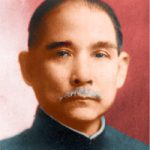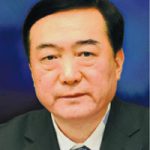Chinese political and ideological campaigns are often packaged into mnemonics or numerical slogans. The habit long predates Communist Party rule. Sun Yat-sen — leader of the Republican revolution in the 1910s — for example, promoted the Three Principles of the People (sanmin zhuyi 三民主义), loosely translatable as nationalism, democracy and social welfare. The following are prominent party doctrines of the first months of the Xi Jingping–Li Keqiang period, organised from one to ten.
One China Principle (yige Zhongguo yuanze 一个中国原则)
In 1992, representatives of the People’s Republic of China and the Republic of China (which most of the world calls Taiwan) signed a document that became known as the ‘1992 Consensus’, by which the two sides agreed to the One China Principle: that there is only one China and both the Mainland and Taiwan belong to it. Meeting in Beijing in February 2013 with the Honorary Chairperson of Taiwan’s ruling Nationalist Party and former vice-president of Taiwan, Lien Chan, Xi Jinping reaffirmed the Mainland’s unswerving commitment to peaceful reunification with Taiwan as well as the One China Principle.
Two Things that Cannot be Negated (liangge buneng fouding 两个不能否定)
On 5 January 2013, Xi Jinping told a party meeting that: ‘The period of history after Opening Up and Reform cannot be used to negate the period of history before Opening Up and Reform; and the period of history before Opening Up and Reform cannot be used to negate the period of history after Opening Up and Reform’. Collectively, these two statements became known as ‘the two things that cannot be negated’ — the different accomplishments of the two eras of the People’s Republic’s sixty-year history: the Maoist era from 1949 to 1978, and the Reform era from 1979 until now.
Three Articles of Faith (sange zixin 三个自信) and the Three Publics (san gong 三公)
In his report to the Eighteenth Party Congress in November 2012, outgoing Party General Secretary Hu Jintao articulated three articles of faith or self-confidence. He declared that these are the decoction of the experiences of ninety years of struggle, creativity and experience on the part of the Party and the People. The three articles are: unwavering confidence in the path (daolu zixin 道路自信), theory (lilun zixin 理论自信) and system (zhidu zixin 制度自信) of Socialism with Chinese Characteristics.
Another trio that has come to even greater prominence since the Eighteenth Party Congress is the ‘Three Publics’. This is an abbreviation of the expression the ‘Three [excessive] Costs to the Public Purse’ (sangong xiaofei 三公消费), which are: overseas travel, limousines and official banquets — three common ways that officials live it up at public expense.
Four Things to Guard Against (sige li jie 四个力戒) and Four Dishes and One Soup (si cai yi tang 四菜一汤)
Just before the Eighteenth Party Congress, the Party Secretary for Dandong in Liaoning province, Dai Yulin, published in the Liaoning Daily (Liaoning ribao 辽宁日报) his list of the four most crucial things for party members to guard against:
- misconduct and loss of probity
- failing to draw the line between friendship and favouritism
- abuse of power
- psychological imbalances linked to corruption.
Dai’s article was later published on the ‘Mass Line Net’ website set up after Xi Jinping resuscitated Mao Zedong’s concept of using a ‘mass line’ to connect with the people.
The first Ming emperor, concerned that officials were banqueting in the middle of a famine, declared that official meals should consist only of ‘four dishes and one soup’. After the 1949 revolution, the first premier of the People’s Republic, Zhou Enlai, revived the concept and, in 1984, Deng Xiaoping did the same. Now it is part of the anti-corruption drive launched by Xi Jinping in early 2013 that, among other things, has focused on extravagant dining and called on officials to eat more frugal meals. High-end restaurants in Beijing reported a sharp drop in their revenues in the first quarter of 2013.
Five Don’ts (wu bu gao 五不搞)
In March 2011, Wu Bangguo, then a member of the Politburo Standing Committee and second in rank in the Party (although not the government), told the National People’s Congress that there were five things China would never do. There was to be:
- no multi-party democracy (bu gao duodang lunliu zhizheng 不搞多党轮流执政)
- no ideological pluralism (bu gao zhidao sixiang duoyuanhua 不搞指导思想多元化)
- no separation of powers or bicameral legislature (bu gao ‘sanquan fenli’ he liangyuanzhi 不搞‘三权分立’和两院制)
- no federalism (bu gao lianbangzhi 不搞联邦制)
- no privatisation (bu gao siyouhua 不搞私有化).
Since coming to power, Xi Jinping has not signalled any departure from the Five Don’ts.
Six Aspects (of the fight against corruption) (liuge fangmian 六个方面)
On 26 March 2013, Premier Li Keqiang addressed a meeting devoted to clean and honest government convened by the State Council. Li outlined six aspects of the government’s anti-corruption campaign for 2013. In abbreviated form, the six aspects were:
- streamlining of government and the delegation of responsibility to lower levels (jianzheng fangquan 简政放权)
- punishment of abuses of power (guanzhu quanli 管住权力)
- careful management of public monies (guanhao qiancai 管好钱财)
- transparent and open government (zhengwu gongkai 政务公开)
- hard work and thrift in administrative practice (qinjian congzheng 勤俭从政)
- investigations into corruption to be guided by the law (yifa cu lian 依法促廉).
Seven Things That Should Not Be Discussed (qige buyao jiang 七个不要讲)
In May 2013, an internal circular entitled ‘On the Current Situation in the Ideological Domain’ (Guanyu dangqian yishixingtai qingkuangde tongbao 关于当前意识形态领域情况的通报) was distributed to party committees. A professor of political science at Shanghai’s East China University named Zhang Xuezhong broke with protocol and openly discussed the contents of the document on his Sina Weibo microblog. He revealed that it listed seven topics on which universities and the media should discourage discussion. Zhang’s post was soon deleted from Weibo and the topic was censored altogether.
The seven things that the Party does not want discussed are:
- universal values (pushi jiazhi buyao jiang 普世价值不要讲)
- freedom of the press (xinwen ziyou buyao jiang 新闻自由不要讲)
- civil society (gongmin shehui buyao jiang 公民社会不要讲)
- civil rights (gongmin quanli buyao jiang 公民权利不要讲)
- historical mistakes by the Party (Zhongguo Gongchandangde lishi cuowu buyao jiang 中国共产党的历史错误不要讲)
- Party-elite capitalism (quangui zichanjieji buyao jiang 权贵资产阶级不要讲)
- judicial independence (sifa duli buyao jiang 司法独立不要讲).
Eight Must Persists (bage bixu jianchi 八个必须坚持) and Eight Honours and Eight Shames (ba rong ba chi 八荣八耻)
The Work Report of the Eighteenth Party Congress directed party members to ‘firmly grasp the basic requirements in eight areas’ — summarised as the ‘Eight Musts or Eight Must Persists’. Party members must persist:
- in supporting the dominant position of the People (bixu jianchi renmin zhuti diwei 必须坚持人民主体地位)
- with the liberation and development of social productive forces (bixu jianchi jiefang he fazhan shehui shengchanli 必须坚持解放和发展社会生产力)
- with Reform and Opening Up (bixu jianchi tuijin gaige kaifang 必须坚持推进改革开放)
- in upholding and safeguarding social fairness and justice (bixu jianchi weihu shehui gongping zhengyi 必须坚持维护社会公平正义)
- in the journey towards shared prosperity (bixu jianchi zou gongtong fuyu daolu 必须坚持走共同富裕道路)
- in promoting a harmonious society (bixu jianchi cujin shehui hexie 必须坚持促进社会和谐)
- with peaceful development (bixu jianchi heping fazhan 必须坚持和平发展)
- in upholding the leadership of the Party (bixu jianchi dangde lingdao 必须坚持党的领导).
Former President Hu Jintao’s widely mocked ‘Eight Honours and Eight Shames’ disappeared from propaganda and state media several years before the end of his term. He first introduced the formula at the Sixth Plenum of the Sixteenth Party Central Committee on 4 March 2006. The Eight Honours and Eight Shames were, according to the English translation provided by Xinhua in October 2006:
- Love the country; Do it no harm (yi re’ai zuguo wei rong, yi weihai zuguo wei chi 以热爱祖国为荣、以危害祖国为耻 )
- Serve the People; Never betray them (yi fuwu renmin wei rong, yi beili renmin weichi 以服务人民为荣,以背离人民为耻)
- Follow science; Discard superstition (yi chongshang kexue wei rong, yi yumei wuzhi wei chi 以崇尚科学为荣,以愚昧无知为耻)
- Be diligent; Not indolent (yi xinqin laodong wei rong, yi haoyi elao wei chi 以辛勤劳动为荣,以好逸恶劳为耻)
- Be united, help each other; Make no gains at other’s expense (yi tuanjie huzhu wei rong, yi sun ren li ji wei chi 以团结互助为荣,以损人利己为耻)
- Be honest and trustworthy; Do not sacrifice ethics for profit (yi chengshi shouxin wei rong, yi jian li wang yi wei chi 以诚实守信为荣,以见利忘义为耻)
- Be disciplined and law-abiding; Not chaotic and lawless (yi zunshou fa wei rong, yi weifa luanji wei chi 以遵纪守法为荣,以违法乱纪为耻)
- Live plainly, work hard; Do not wallow in luxuries and pleasures (yi jianku fendou wei rong, yi jiaoshe yinyi wei chi 以艰苦奋斗为荣,以骄奢淫逸为耻).
Li Keqiang in Nine Characters (Li Keqiang jiuge zi 李克强九个字)
At a press conference following the conclusion of the annual National People’s Congress on 17 March 2013, the new Premier, Li Keqiang, answered a question from a journalist related to his personal vision (geren qinghuai 个人情怀). Li summed up his insight into the world in nine Chinese characters — xing dadao, min wei ben, li tianxia 行大道、民为本、利天下 — roughly meaning: ‘Follow the Great Way [which relates broadly to Daoist and Confucian thought]; [remember that] the People are the foundation of everything [a Confucian precept]; and benefit All-Under-Heaven’ [All-Under-Heaven is an expression that signifies the world, but traditionally refers to the civilised territory of China as we noted in the Forum ‘Dreams and Power’].
Ten Measures to Safeguard Stability in Tibet (shiyige weiwen cuoshi 十个维稳措施)
On 4 January 2012, a conference on stability maintenance in Tibet was convened in Lhasa. The Party Secretary for Tibet, Chen Quanguo, outlined ten measures for maintaining stability. They are, in abbreviated form:
- Heighten management in rural areas
- Strengthen and modify the management of monasteries and temples
- Implement a management system based on an urban grid to enforce social stability
- Prioritise the protection of Tibetan Buddhism and within the confines of the law, reconcile Tibetan Buddhism with Socialism with Chinese Characteristics
- Strengthen social control and the supervision of hotspots; closely monitor online activity and new means of communication
- Expand employment opportunities and improve people’s living conditions.
- Promote peaceful coexistence between different ethnic groups
- Instill socialist vigour in students by strengthening control over campus life and shaping the opinions of young people
- Strengthen the influence of advanced socialist culture in order to guarantee the safety of all spheres of Tibetan ideology; thoroughly criticising,
- exposing and suppressing all influence of the Dalai Lama
- Make the maintenance of stability top priority; institute a chain of responsibility and mechanisms for dealing with emergencies.








